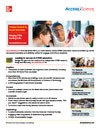Autism, also known as autism spectrum disorder (ASD), is a complex neurodevelopmental condition that impairs the way that a person relates to and communicates with other people. In addition, autism is characterized by restricted, repetitive, or stereotyped behavior. One unusual aspect of this condition is that many autistic individuals also experience problematic gastrointestinal (GI) symptoms, although the underlying mechanisms have yet to be determined. Therefore, researchers have sought to ascertain whether the gut's microbiome influences behavior. See also: Autism; Gastrointestinal tract disorders; Microbiology; Microbiome

The microbiome (also known as microbiota) is the collective term for the microorganisms (and their genetic material) that live on or in the human body, and a large percentage of the microbiome resides in the GI tract. The field of neuroscience has been revolutionized through the discovery of interactions between the microbiome and the central nervous system. In other words, the GI tract can be viewed as an ecosystem that is affected by the central nervous system and that also affects the central nervous system. In fact, evidence suggests that the gut's microbiome is involved in the pathogenesis of autism. Thus, a healthy mixture of the bacteria constituting the microbiome in the gut might provide physiologic and behavioral benefits to the host. See also: Factors related to risk of autism; Human microbiota; Immune regulation by the microbiome; Medical bacteriology
In particular, scientists have noted that the intestinal tracts of autistic individuals contain fewer and less diverse types of bacteria compared to the intestinal tracts of normal youths. Specifically, Prevotella bacteria were absent, indicating a possible role for these microorganisms in the development of behaviors associated with autism. In one study, 18 young individuals (between the ages of 7 and 16) were given fecal transplants of microbial intestinal flora from healthy donors for two months. The results were notable. By providing a more beneficial mixture of gut bacteria, including Prevotella, the autistic youths reported dramatically fewer GI abnormalities and displayed improved behaviors with regard to their autism (for example, reduced hyperactivity and irritability, and fewer instances of repetitive actions). Remarkably, these young individuals continued to show these improvements more than two years after the fecal transplant therapy, meaning that the gut microbiomes of these individuals remained more diverse and healthier. Most importantly, the frequency and intensity of the symptoms of autism in these youths continued to diminish as well. Thus, researchers want to expand the breadth of the aforementioned study to include more people with autistic symptoms, encompassing individuals across a wider variety of ages. See also: Bacteria; Digestive system; Transplantation biology; Use of fecal transplants to treat intestinal disorders





